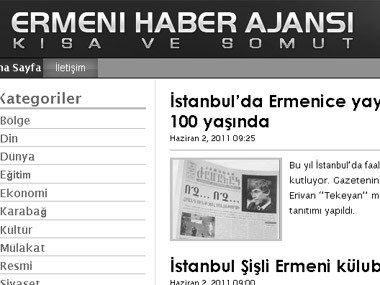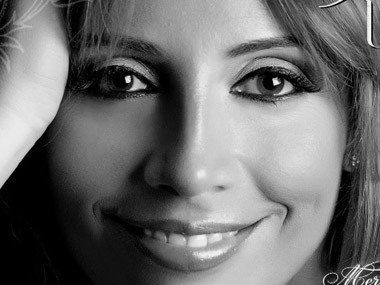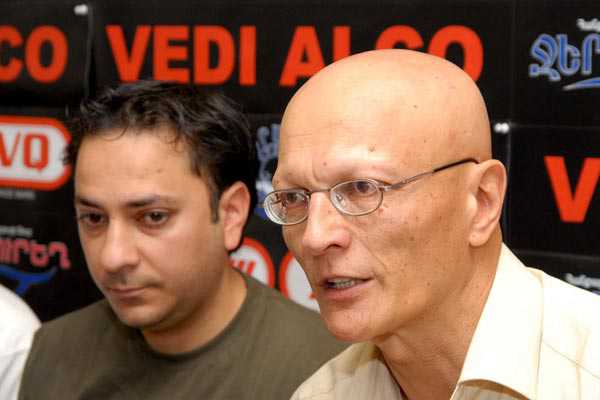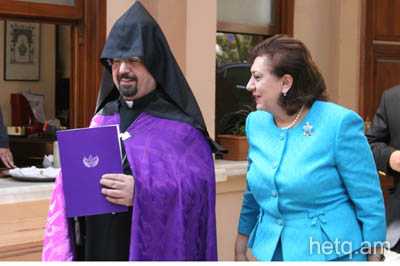The new constitution of Turkey should embrace all of its citizens and elevate individual rights and freedoms equally for all as opposed to the 1982 Constitution, which reinforced state and military authority and introduced substantial restrictions to the exercise of individual rights and freedoms, non-Muslim Turkish citizens indicate.

A member of Turkey’s Greek Orthodox community in an İstanbul church. Non-Muslims demand equality for minorities in the new constitution.
When asked by Sunday’s Zaman if Turkey needed a new constitution, most of the non-Muslim “minority” citizens of Turkey were no different than the majority of the voices in Turkey in their demands for a new, democratic and civilian constitution, and they always made references to the 1982 Constitution, which was drafted in the aftermath of the Sept. 12, 1980 military takeover.
“Instead of the 1982 Constitution, which blesses and protects the state and also says that rights can be restricted, a new constitution should be made to put emphasis on human rights, provide social justice and give people rights to live in accordance with their identity,” said Arus Yumul, a professor of sociology and a Turkish citizen of Armenian origin.
Laki Vingas, representative of several minority foundations and a Turkish citizen of Greek origin shares the same opinion. “Making a new constitution is important for every Turkish citizen. It is utterly disturbing that we still have the constitution of the 1980 military coup,” Vingas says.
Researcher and writer Nail Güleryüz, a Turkish citizen of Jewish background, is of the same opinion, and Zeki Basatemir, a member of the board of directors of the Syriac Catholic Church Foundation in Turkey, added that Turkish citizens of Syriac origin also demand a constitution which would emphasize individual rights and freedoms.
The Sept. 12 coup d’état was the third coup in Turkey’s history which came after a period of ideological armed conflict on Turkey’s streets during the second half of the 1970s. An estimated 5,000 people were killed during the political violence. Some 600,000 were reportedly detained, more than 200,000 were tried, over 10,000 were stripped of their citizenship and 50 people were executed while hundreds of thousands were tortured and went missing during the military coup administration.
But should a new constitution have special provisions for non-Muslims in Turkey, where they are supposed to have safeguards under the “Protection of Minorities” clause of the 1923 Treaty of Lausanne? According to Güleryüz, a constitution should “justly embrace” all individuals of the country and should not give special privileges, even positive discrimination, to any individuals or institutions. “Therefore, there should not be special clauses for Turkish citizens of Jewish origin,” he said. “It would be adequate for Turkey’s Jewish people — even though they can be considered a ‘minority numerically’ from the perspective of religion — to have equal rights and responsibilities.”
He also recalled that the chief rabbi and the Jewish community leaders of the 1920s relinquished many special privileges provided to minorities by the Treaty of Lausanne.
Vingas regards the special clauses of the Lausanne Treaty regarding minorities as a thing of the past. “I don’t want to tell my children who will be born in 2020 that they are bound by the rules of 1923,” he said. “I am a normal citizen in this country, not separate or apart.”
The number of Turkish citizens of Jewish and Syriac origin has been estimated to be around 25,000 each, while this number is around 3,000 for the Turkish citizens of Greek origin. The Turkish-Armenian community is the largest of the minority groups in Turkey with a population of approximately 60,000, mostly in İstanbul. Despite protections, non-Muslims faced injustices in Turkey, a fact which has been recently stated by a government official. Ruling Justice and Development Party’s (AK Party) Deputy Chairman Hüseyin Çelik had told Sunday’s Zaman that “the deep state” and the “pro-single-party spirit of the Republican People’s Party [CHP]” lies behind the injustices that were done to non-Muslims in Turkey. The single-party period of Turkey begins with the CHP being the only party after the founding of the republic on Oct. 29, 1923 and ends in 1946 with the establishment of the National Development Party (MKP).
“Serious injustices were done to all these groups during the single-party era in Turkey; however, the injustices done to the non-Muslims were more severe. The wealth tax was a disgrace. The closure of the Greek seminary was a great shame. The Sept. 6-7 incidents were an inhumane conspiracy that humiliated Turkey in the eyes of the world,” Çelik said.
He was referring to the tax which was levied on the wealthy citizens of Turkey in 1942, with the stated aim of raising funds for the country’s defense in the event of eventual entry into World War II. Those who suffered most severely from this tax were non-Muslims: Jews, Greeks, Armenians and Levantines. Established on Oct. 1, 1844, on Heybeli Island — or Halki in Greek — in the Marmara Sea, the Halki Seminary was the main school of theology for the Eastern Orthodox Church’s patriarchate in İstanbul until its closure by Turkish authorities in 1971. The unfortunate events of Sept. 6-7, 1955 started after a newspaper headline said the home of the nation’s founder, Atatürk, in Greece had been bombed by Greek militants. Fired up by the media, mobs killed and harassed non-Muslims and non-Turkish minorities in a massive campaign.
“Republican governments always wanted to destroy minorities,” said Turkish-Armenian journalist Pakrat Estukyan, adding that a good portion of non-Muslims still do not trust the state because of what happened in the past.
“Since 1923, even Lausanne has been subject to being run over,” he said. “We are in the process of democratization but there is not a consensus in society about how a more democratic constitution should be.”
Like most people in society, non-Muslims also stress the need for a wide-ranging consensus in society for making the new constitution, and that a new constitution should be made by the new Parliament, but not only by the ruling party even if it garners enough votes on June 12.
“Unions, civil society groups, institutions and businesses should agree on the principles. Even parties which remained out of Parliament as a result of the election should be consulted in the process of making a new constitution,” Vingas said, pointing out the 10 percent election threshold.
“For the constitution not to be an arena of power-sharing among the powerful, citizens’ participation into the process is essential, especially in societies that have a tendency to resort to violence,” Yumul said, adding that no matter how well-written, no constitution would provide equal citizenship for non-Muslims if it doesn’t go hand-in-hand with a general understanding for the meaning of equal citizenship.
In that regard, Basatemir stressed that non-Muslims will feel their “equality” if de facto practices disappear.
“Although there are not written rules, I am not allowed to have a career in the police, military and in high levels of the bureaucracy because I am a Christian,” he said. “We appreciate recent reforms in Turkey but we should have an understanding that non-Muslims are Turkish citizens, too.” In addition, Güleryüz emphasized the prevention of the hate crimes.
Some civil society groups have been raising their voices against hate speech and hate crimes, which are serious problems in the country, and emphasizing that there is a need for legislation to combat them. The cases they give include the 2007 murder of journalist Hrant Dink, who was the editor-in-chief of the Turkish-Armenian weekly Agos; in Malatya, the Zirve murders of 2007 when three people who had sold Christian literature were brutally killed; and the murder of Catholic priest Father Andrea Santoro in Trabzon.





